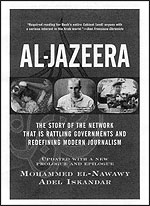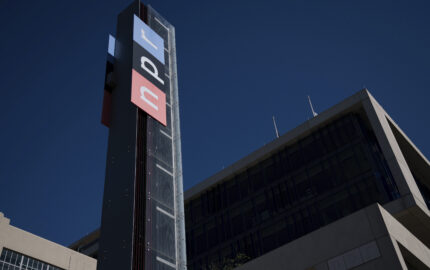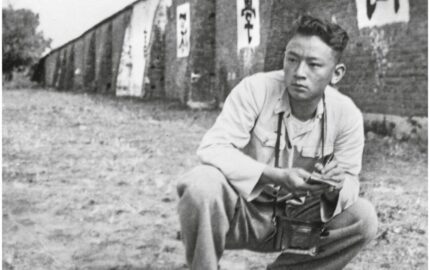
Al-Jazeera: The Story of the Network That is Rattling Governments and Redefining Modern Journalism
Mohammed el-Nawawy and Adel Iskandar
Westview Press. 240 Pages. $16 pb.One of the early acts of the new Iraqi government after receiving formal power from the United States last summer was to close the offices of Al-Jazeera Television. So much for a free press. The outgoing American authorities could hardly profess to be shocked. They and the U.S. military had been chafing at the Arabic language news network for months. Secretary of Defense Donald Rumsfeld led the charge, blustering ironically about propaganda.
For sure, Al-Jazeera’s sensational drumbeat is pretty hard to take for those caught in the harsh glare of its lenses. That includes the United States, other Western powers, and Israel, who usually play the role on Al-Jazeera as invaders and occupiers. But it also often includes Arab regimes, many of which have reacted angrily to finding themselves in the unaccustomed spot of being the subject of critical news on an Arabic channel.
“Al-Jazeera: The Story of the Network That is Rattling Governments and Redefining Modern Journalism” is a useful backgrounder for understanding the origins of this controversial Qatar-based network. First published in April 2002, the book was rereleased in August 2003 in paperback. The new version updates its emphasis on Afghanistan with a hurried epilogue on Iraq by authors Mohammed el-Nawawy and Adel Iskandar, faculty members at Stonehill College in Massachusetts and University of Kentucky, respectively.
The book offers a fairly apologetic defense of Al-Jazeera—its network is hardly “not biased,” as the authors claim at one point, any more than Fox News Channel is unbiased. And they glide too gently over some of its journalistic excesses. A more current view of Al-Jazeera’s news operation and an intriguing comparison with mainstream journalism is the documentary, “Control Room,” by Jehane Noujaim.
But the book offers a good corrective lens to view the motives of the Arabic station: Al-Jazeera is less about anti-Americanism and more about scrappy journalism than its critics concede. The authors look to the training of Al-Jazeera’s original staffers in 1996— many of them from the BBC Arabic service—for the ethos of the network today. Those staffers, while admittedly critical of U.S. motives in the Middle East, are most animated in their zeal to create controversy by presenting disputing views, by shoving the camera in unwelcoming places, by poking at sacred cows, and by presenting an unsoftened view of events. Sounds like what journalists are supposed to do.
That often means presenting raw, bloody video of the violence in the Middle East, pictures of grieving widows and bombed out homes, taunting diatribes from Osama bin Laden, pathetic pleas from hostages in Iraq on their way to being beheaded, and heavy-handed pictorial comparisons between Israeli troops oppressing Palestinians and U.S. troops in Afghanistan or Iraq. Its talk show hosts shout and its guest sometimes say outrageous things. Its reporters call suicide bombers “martyrs.”
Is that news or incitement? If we only stop Al-Jazeera, goes the logic of its critics, no one will get excited about these things. They won’t even know. Of course, that is patently untrue. It is untrue partly because of Al-Jazeera’s success. The network’s popularity among Arabic-speaking viewers worldwide has spawned copycats. Its place on the ground in Iraq has been replaced by Al-Arabiya, another scrappy upstart 24-hour network based in Dubai. Other Arab networks like Abu Dhabi Television, LBC from Lebanon, and MBC, which is Saudi-owned and based in London, have become more aggressive and proactive in their newsgathering to compete. And even though its reporters are banned from working in Iraq, Al-Jazeera still uses the phones, satellite feeds from other channels, and its impressive contacts to present a credible view of what is happening inside the country.
The squeamish secret among Western journalists in Baghdad is that these stations are now an important part of their establishment news operations. As the danger for foreign reporters has increased, their mobility has shrunk, and their ability to put their own eyes on events has diminished. That means they have to rely on other sources: brave Iraqi stringers who do the legwork needed, wire services largely manned by nationals, telephone contacts, and the Arabic television networks.
Those sources are not accepted uncritically. Western reporters strive to crosscheck and confirm. But the cameras of the Arabic stations are often on the scene with pictures of what happened. Their reporters often interview people out of reach of Western reporters. Their studios are the place for debate and interviews with officials to whom the rest of us have less access. So what appears on those channels does make its way into mainstream news reports in increasingly vital doses.
The Shifting Truth
All the debate about Al-Jazeera’s slant on the news misses a larger, and more ominous, truth. For a reporter in Iraq—and elsewhere in the Middle East—one of the most depressing discoveries is the parallel dimensions of reality. Most reporters there really believe in what they are doing, even if it’s hidden under a snort of cynicism. They believe that if they just do their job well enough, people will know, they will understand.
But in the places we report, we are quickly confronted with a reality of conspiracy theories and imagined plots so widely believed that it mocks our pursuit of truth. I have stood at the crater created by a suicide bomber driving a truck, a wild-eyed Arab man whom witnesses described in chilling detail as he careened toward an Iraqi police station. In the next 30 minutes, I watched as those eyewitness accounts, honest in their freshness and consistency, were twisted by a growing mob. By the time I left, the Arab suicide bomber had been erased and replaced by screaming “witnesses” who “saw” American fighter planes dropping a bomb on the site, a version that would be believed by many from then on, despite the news accounts that followed.
It was no longer shocking to me to hear otherwise thoughtful Iraqis insist that the attacks on Americans and Iraqi citizens are carried out by the United States to give it an excuse to occupy Iraq for the oil. Or that the attacks of September 11, 2001, were orchestrated by Israel, and the 4,000 Jews who worked in the World Trade Center were warned not to come to work. Nor, unfortunately, was I surprised to accompany U.S. Marines, who insisted with genuine sincerity that the Iraqi men they held at gunpoint on the ground truly understood that the Americans are well intentioned, and the Iraqis held no grudge. Or to hear American military officials insist that the great majority of Iraqis want them to stay in the country, a fantasy forged by the failure to really talk with Iraqis and a total rejection of the reports by the journalists who did so.
Such incredulous beliefs on both sides are stomach-turning stuff for a reporter. They expose the futility of our journalistic faith in the truth. As el-Nawawy and Iskandar point out, Al-Jazeera has a good record—if not a perfect one—of trying to debunk the most absurd of those theories, on both sides. Whether in search of controversy or ethics, no matter: Al-Jazeera’s willingness to challenge smug assumptions is admirable enough to have made the network itself the subject of conspiracy rumors that it is secretly controlled by the Mossad or CIA.
It would be a stretch to say Al-Jazeera is seeking to close the gap of misunderstanding between the Middle East and the West. But it is safe to say the Arabic network is backfilling that chasm with information, debate and real news—no matter how uncomfortable or occasionally off mark. That is a good thing and one that all should applaud.
Doug Struck, a 2004 Nieman Fellow, has reported from Iraq and the Middle East often since 1990, most recently this summer. He is Canada bureau chief for The Washington Post.



